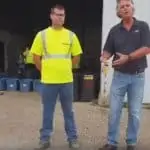

SCS Engineers, in partnership with the Wisconsin Department of Natural Resources – WDNR, is performing a waste sort to determine what’s in the trash going into Wisconsin’s landfills. During the waste audit, SCS will collect at least 200 samples of waste from 12 waste disposal sites across the state for eight weeks.
Solid waste, recycling, and diversion planners need to differentiate between the composition and sources of waste to appropriately manage recycling and diversion programs. These programs help citizens and businesses make the most out of their waste material and help control the cost of waste management.
Waste diversion can positively impact communities’ environmental health, reduce the potential for soil and water contamination, and conserve resources while reducing landfill operation costs. Municipal solid waste, called MSW, typically contains valuable materials. The cost of manufacturing using virgin materials increases, but technology creates new avenues for reusing materials formerly thrown away. The pandemic has influenced what we are consuming and where we dispose of wastes, from home or the office, influencing materials markets.
WDNR uses the waste audit data to evaluate current waste diversion programs’ effectiveness to identify and quantify additional materials that Wisconsin could divert from its landfills and serve as a baseline to measure future efforts. By comparing the new data to a previous waste composition study, WDNR can measure the impact of existing recycling and hazardous waste management programs. The comparison further helps identify waste generation trends and how the waste stream is changing.
The waste characterization study separately analyzes the waste stream generated from various sources, including residential, industrial/commercial/institutional, construction & demolition. For solid waste, recycling and diversion planners, it is vital to differentiate waste sources to target programs properly.
All of this helps make recycling more effective and identifies ways to reduce and reuse a large percentage of what is landfilled.
Many items we throw away have continued value. Cell phones and electronics contain valuable materials, like gold, for example. Cardboard is exceptionally valuable now, as citizens and businesses are taking more deliveries at home. Organics such as food and yard waste can turn into compost. Aluminum and steel cans can be recycled over and over again to make new cans. According to the Aluminum Association’s Can Committee, making a new can from recycled aluminum takes 95% less energy and releases 95% fewer greenhouse gases than creating the same can without recycled material.


Waste characterisation studies are important tools for helping local governments and private companies make decisions on the best solid waste management programs, policies, and technologies to reduce short-lived climate pollutants. Knowing what materials comprise your waste stream will help you establish the right mix of waste diversion and energy programs to make your community more sustainable.
This webinar led by Brent Dieleman of SCS Engineers, a Senior Project Professional with the division of Sustainable Materials Management provides information on how to conduct a waste characterisation study, what data you can expect to obtain from a study, and how it can be used to make solid waste program and policy decisions. Topics of discussion during the webinar include:
We thank Abt Associates on behalf of the US Environmental Protection Agency for the CCAC Waste Initiative for sponsoring the webinar which took place on March 2, 2018, at 2:00 pm CET.
View the webinar by clicking here.

Webinar Description
A waste characterization study is an important tool for helping local governments and private companies make decisions on the best solid waste management programs, policies, and technologies to reduce short-lived climate pollutants. Knowing what materials comprise your waste stream will help you establish the right mix of waste diversion and energy programs to make your community more sustainable.
This webinar provides information on how to conduct a waste characterization study, what data you can expect to obtain from a study, and how it can be used to make solid waste program and policy decisions. Topics of discussion during the webinar include:
Webinar access:
Join WebEx meeting
Meeting number (access code): 648 518 922
Join by phone
+1-415-655-0002 US Toll
Global call-in numbers
Thank you to the United Nations Environment, Climate & Clean Air Coalition (CCAC) for sponsoring this valuable event.